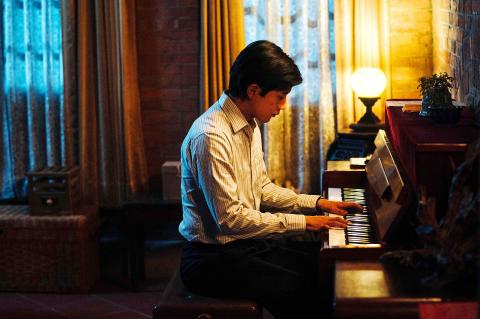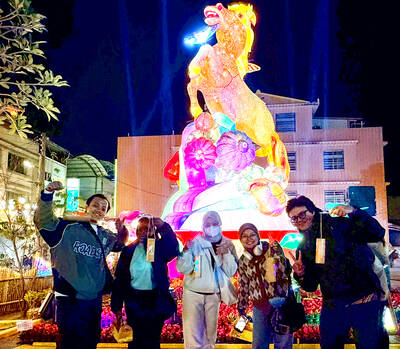The novelist Lu He-ruo was active from the Japanese colonial period to the early post-war period in Taiwan. His Japanese-language novel Oxcart was well-received in literary circles at the time. Also known as a musician, vocalist and revolutionary, Lu lived a very storied life.
Hakka TV’s 2018 drama Rosan 1914 takes up Lu’s story from the Japanese colonial period with an adaptation of his life in a TV drama which brings together nine of his novels.
Director Lou Yi-an is fascinated by Taiwanese history circa 1945, during the war’s waning years. When Lou discovered Lu had captured the spirit of that period in his diaries, he decided to shoot his story to introduce audiences to what Taiwan was like back then through the life of this legendary figure.

Photo courtesy of Hakka TV
照片:客家電視台提供
“Many people know about the Gwangju Uprising through South Korean movies, but have no idea of events that happened in Taiwan,” Lou says, speaking of the time when Taiwan went from being a Japanese colony to being governed by the Chinese Nationalist Party (KMT). Lu would have been conflicted over whether he saw himself as a Japanese or a Taiwanese and “this confusion would have been felt throughout Taiwan at the time.”
In order to merge Lu’s novels and life story, the drama uses stage performances, employing the rarely used play-within-a-play format to bring a unique approach to the scenes.
Lu’s talent went beyond writing novels: He was also an accomplished musician and a vocalist. To make his role more believable, actor Mo Zi-yi – who cannot play the piano – spent many hours learning piano fingering technique, not wanting to rely on a hand model or by keeping his hands out of shot. Mo even memorized the lyrics from German music so that he could get the mouthing of the words right for the camera.
According to Mo, every historical figure has many aspects to their character, and in addition to the more positive side of Lu’s personality, he wanted to show something of the more vulnerable and less assured aspects that would make the character more believable. “If he is presented as too perfect it won’t come off as genuine; that’s not how I see acting,” Mo says.
Filming for Rosan 1914 began in November, and is expected to hit the screens in April this year.
(CNA, translated by Paul Cooper)
呂赫若為活躍於台灣日治時期到戰後初期的小說家,其日文小說「牛車」受到當時文壇高度矚目,同時更具有音樂家、聲樂家、革命家等身分,人生充滿傳奇故事。
客家電視台推出二○一八年度戲劇「台北歌手」,從日治時代的呂赫若談起,將他的精彩生平改編,串聯呂赫若九篇小說拍成電視劇。
導演樓一安對於台灣在一九四五年戰爭末期那段歷史十分有興趣,他透過呂赫若撰寫的日記看到那個世代的風華,也促使他想拍呂赫若的故事,盼讓觀眾透過這名傳奇才子的一生,重新認識那段時期的台灣面貌。
「大家可能透過韓國電影知道韓國光州事件,反而不瞭解台灣本土的故事」,樓一安說,從日治到民國時期,呂赫若當時處在自己是「日本人」還是「台灣人」的矛盾中,「這也是那個時代普遍的困惑」。
為了將呂赫若的小說和人生故事交錯呈現,劇中結合舞台劇表演方式,以少見的「劇中劇」挑戰不一樣的拍攝鏡頭。
呂赫若除了是小說家,還具有音樂家、聲樂家的優異才華 。為了讓劇中角色更有說服力,不會彈琴的莫子儀花相當多時間練鋼琴指法,坦言不想依賴手模或避開鏡頭借位,甚至背下德文聲樂歌詞,配合嘴型拍攝,下足功夫力求演出到位。
莫子儀認為,每個歷史人物的性格都有不同面向,除了風光正向的一面,演出無助脆弱或無能為力的時候,都能讓人物更真實,「包裝太完美就過於虛假,這不是我對表演的信念」。
「台北歌手」去年十一月底開拍,預計今年四月播出。
(中央社)

A: Harvard professor Robert Waldinger’s “7-day Happiness Challenge” includes: Day 1: Take stock of your relationships; Day 2: The secret power of an 8-minute phone call; Day 3: Small talk with strangers has big benefits. B: That’s not too hard. What’s next? A: Day 4: Why you should write a “living eulogy;” Day 5: The importance of making work friends; Day 6: Don’t cancel those social plans. B: Good ideas. What’s the final challenge? A: Day 7: Keep happiness going all year long. So, I’m inviting some friends to the Taipei Lantern Festival today to build good relationships. Wanna

A: Happy Lunar New Year. I wish you joy and health in the Year of the Horse. B: Thanks, you too. Actually, the Harvard Study of Adult Development claims that they’ve finally discovered the secret to living a happy life after 85 years of research. A: What is it? Money? Fame? Career? B: Nope, the key is good relationships. Professor Robert Waldinger, the principal investigator, portrays one’s relationships as “social fitness,” and has worked with the New York Times to launch the “7-day Happiness Challenge.” A: I wanna be socially fit. How can I participate in this challenge? A:

★ 本文由生成式 AI 協作,本刊編輯編修。 For tourists looking for a scenic way to spend an afternoon in Kaohsiung, heading to the British Consular Residence of Takao is the perfect choice. Its elevated position allows one to take in the bustling Kaohsiung Harbor to the east and the dazzling sunset over Sizihwan Bay to the west. This elegant red-brick building also serves as a portal to the city’s rich history. Interestingly, for 70 years, many people mistakenly identified this residence as the actual consulate. The history of “Takao,” the former name of Kaohsiung, began its international chapter in the mid-19th century. As European powers

★ 本文由生成式 AI 協作,本刊編輯編修。 Continued from yesterday(延續自昨日) https://www.taipeitimes.com/News/lang Kaohsiung’s deep connection with the sea continues to thrive, with Kaohsiung Harbor remaining a crucial hub for global shipping. In addition to the port, the city has emerged as a major player in another world-class maritime industry—yacht manufacturing, responsible for producing 80 percent of all Taiwan-made yachts. The yacht industry in Taiwan originated in the post-World War II era, when the US military presence in Taiwan provided local boat builders with guidance on making wooden yachts. The resulting craftsmanship was so exquisite that orders soon poured in. In 1977, Taiwan replaced Canada as the main yacht